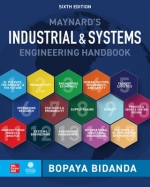Tab Article
The classic industrial engineering resource—fully updated for the latest advances
Brought fully up to date by expert Bopaya M. Bidanda, this go-to handbook contains exhaustive, application-driven coverage of Industrial Engineering (IE) principles, practices, materials, and systems. Featuring contributions from scores of international professionals in the field, Maynard’s Industrial Engineering Handbook, Sixth Edition provides a holistic view of exactly what an Industrial Engineer in today’s world needs to succeed. All-new chapters and sections cover logistics, probability and statistics, supply chains, quality, product design, systems engineering, and engineering management.
Coverage includes:
- Productivity
- Engineering economics
- Human factors, ergonomics, and safety
- Compensation management
- Facility logistics
- Planning and scheduling
- Operations research
- Statistics and probability
- Supply chains and quality
- Product design
- Manufacturing models and analysis
- Systems engineering
- Engineering management
- The global Industrial Engineer
- IE application environments


